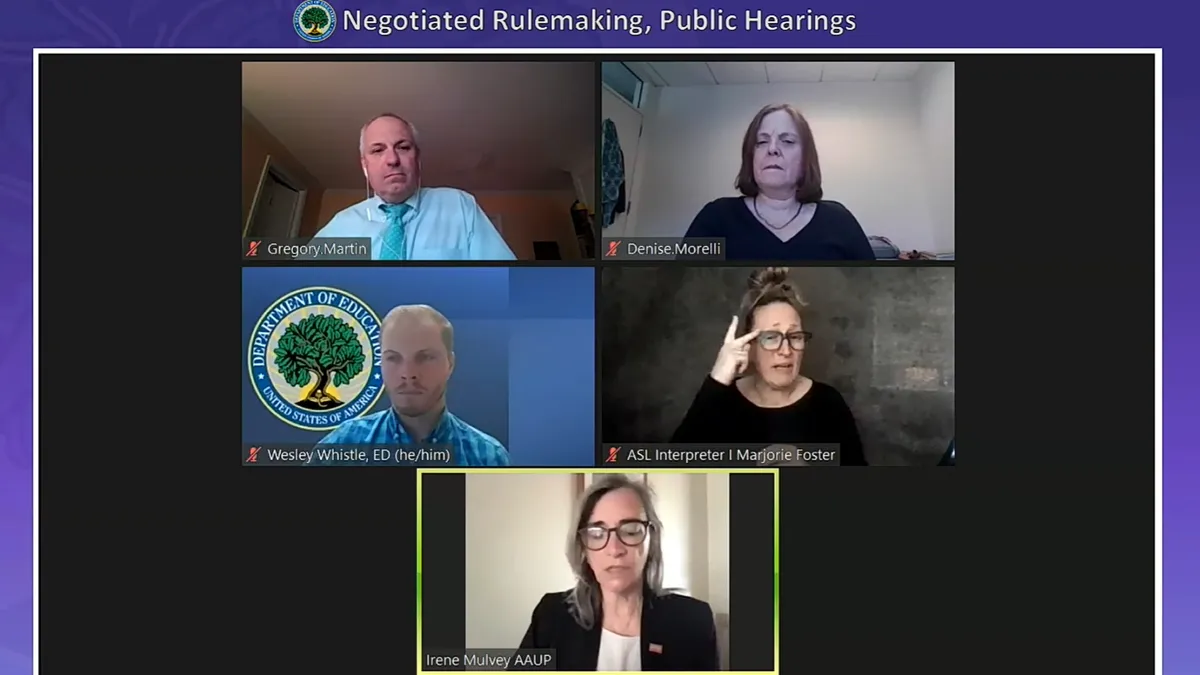Dive Brief:
- The U.S. Department of Education began a series of virtual meetings Tuesday to hear feedback on its expansive regulatory agenda, which could include reworks to college accreditation, federal student aid and distance learning policies.
- The public hearings, which are scheduled through Thursday, serve as a precursor for what will likely be a months-long process of negotiating over new rules starting in the fall. The department will bring in representatives from across the higher ed sector to iron out policy differences.
- Several speakers Tuesday urged the Education Department to beef up student consumer protections and better hold poorly performing institutions accountable. Others criticized the agency’s recently expanded definition of third-party vendors that service colleges. Colleges have argued that this policy, which takes effect in September, would impose onerous oversight on areas like study abroad programs and online program management.
Dive Insight:
The Education Department is taking on a colossal regulatory docket — one some policy experts say might be too large to accomplish in the remainder of President Joe Biden’s term.
That’s especially true for the Office of Federal Student Aid, which is handling mammoth tasks such as simplifying the Free Application for Federal Student Aid, or FAFSA, form without major additional funding from Congress.
Under Biden, the Education Department has also prioritized retooling the beleaguered federal student loan system, through proposed changes like reducing the minimum amount borrowers need to contribute monthly to income-driven repayment plans.
Top of mind for many colleges, however, is the department’s updated guidance on what constitutes a third-party servicer, which are subject to stricter reporting requirements.
The Education Department isn’t pursuing the formal regulatory process to make the change, but it still could have major ramifications and was thus addressed during Tuesday's listening session. The new definition will significantly broaden what counts as a third-party servicer to include any entity that provides “any aspect” of colleges’ participation in the Title IV student aid program.
Colleges also couldn’t work with providers if they're located outside the U.S. or if their owner or operator is not an American citizen or permanent resident. This has raised concerns institutions couldn’t pay incentives to foreign recruiters focused on international students.
Greg Hess, president of IES Abroad, a nonprofit academic consortium of colleges that provides international education and study abroad opportunities, reiterated some of these fears to Education Department officials Tuesday.
He said the new guidance would make study abroad inaccessible to students receiving federal aid.
“It appears to make it impossible for study abroad services to operate anywhere in the world if they utilize foreign subcontractors” Hess said. “And please note that every single study abroad program, no matter the operator, relies on overseas subcontractors for these types of services.”
Others spoke about strengthening oversight of distance learning. Major management of distance learning falls to the National Council for State Authorization Reciprocity Agreements, or NC-SARA, an organization that controls an interstate pact in which every state but California participates.
Consumer protection advocates have pushed for changes within NC-SARA, saying its policies lack guardrails for students and allow low-quality online programs to flourish.
Kyle Southern, associate vice president of higher education quality at The Institute for College Access & Success, said state regulation means little if colleges can bypass the rules through NC-SARA.
Southern and others spoke about protecting students generally. A few speakers said students should be at the table when the Education Department starts to work on new regulations, a process called negotiated rulemaking.
Irene Mulvey, president of the American Association of University Professors, also expressed the need for faculty to participate in negotiated rulemaking. This is particularly important as states propose bills designed to limit faculty power, including the elimination of tenure and which subjects they can teach, she said.
“The faculty voice must be front and center,” Mulvey said.














